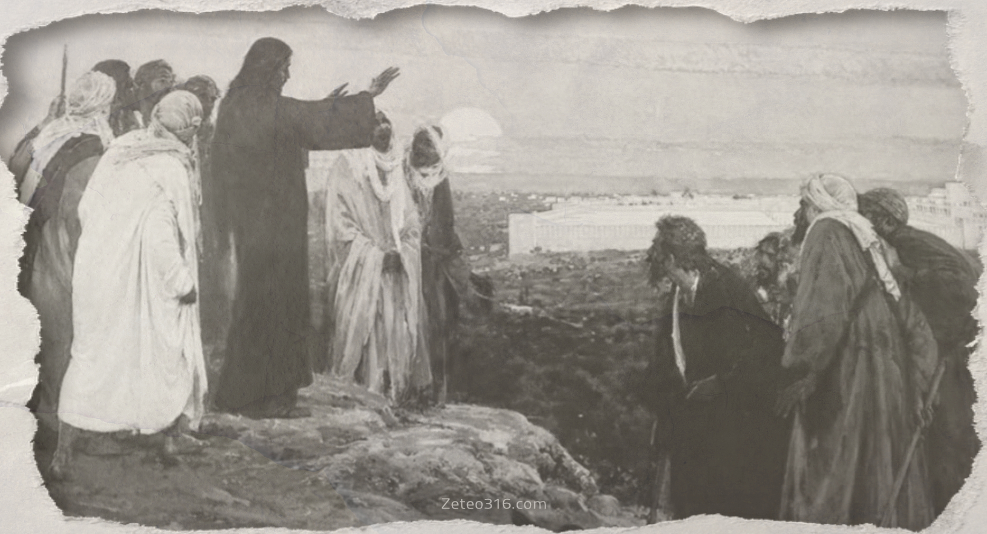
What was the context of the Disciples’ Olivet Discourse Questions? This issue constantly comes up in millennial and rapture timing discussions. I have touched upon this before, but it doesn’t hurt to revisit the topic.
An eschatological tug of war
Depending on one’s eschatological assumptions (or requirements), they’ll either emphasize the church or Israel in the Olivet Discourse (OD). So you end up with an eschatological tug of war.
Those who see the church as heavily represented do so (I think) because of their rapture timing positions (prewrath-posttrib). For example, in The Sign, Robert Van Kampen asserted that the OD was written for the church, that its application is to believers rather than unsaved Israel.
In recent years Alan Hultberg (Three Views on the Rapture) wrote that, Jesus in some way has replaced Israel; that He “fulfills the role of Israel itself.” Hultberg wrote, “Thus for Matthew, to belong to Israel one must belong to the Messiah, Jesus.” He concluded that Jesus had rejected Israel as a whole.
In Hultberg’s view, Matthew views the church as in a sense “the inheritor of the Jewish Kingdom.” Regarding that last statement Dr. Larry D. Pettegrew notes that that would mean Jesus was a supersessionist. For more, see page 279 in the book edited by Pettegrew, “Forsaking Israel.”
What some posttribulationists say
Larry Pettegrew identifies several claims by posttribbers: 1) The disciples were the original recipients of the OD; 2) National Israel had rejected Christ and was permanently set aside; 3) Thus the disciples now represent the church; 4) Therefore the OD’s focus is about the future church in the Tribulation; 5) And so the OD teaches a posttrib rapture.
Perhaps the most obvious result of this position affects the interpretation of Matt 24:31. What is the gathering of the elect? See also HERE. Is Matt 24:31 the rapture of the church or the promised final gathering of redeemed Israel? Reading the church into the OD ignores the references to Israel as an elect nation (OT & NT) and its future redemption and gathering.
There isn’t enough space to cover Pettegrew’s response to the posttrib reasoning above. I do recommend reading “Forsaking Israel.” It makes a strong case against both the posttrib position and the idea that Christ somehow replaces Israel (Hultberg etc). See also Israel Replacement Eschatology and Dispensationalism: A Step Up for the “Israel of God.”
The context of the Disciples’ questions
As Larry Pettegrew points out, the immediate context of the disciples’ question centered around two things: When will the Temple be destroyed? And what the signs of the Second Coming and the end of the present age are. Essentially these were Israelitish concerns.
He concludes by noting that the correct interpretation of the passage is not determined by who the disciples allegedly represent. It is settled by their questions. Do they ask about the future of the church or of the future of Israel? Clearly these questions center on Israel’s future in relation to the temple, Messiah and the Kingdom.
Dr. Pettegrew adds that this isn’t to say that the OD has no application to the church, as “all Scripture is profitable to all believers for doctrine, reproof, correction and instruction in righteousness.” But the subject of the OD is not he church, the story is about Israel.
Disciples still asking questions about the church and/or rapture
I’ve made this point before: by the time the Lord is about to ascend into heaven the disciples inquire about the church and the timing of the rapture, right? After all that is what you and I would do, yes? This is after having spent 40 days with Jesus discussing the Kingdom. But no, that isn’t what the disciples ask Jesus. These issues weren’t on their Israelitish minds.
And so when they had come together, they were asking Him, saying, “Lord, is it at this time you are restoring the kingdom to Israel?” He said to them, “It is not for you to know times or epochs which the Father has fixed by His own authority…” Acts 1:6-7
Of course, if you read into Christ’s response that He is rejecting a future Israelitish Kingdom (He clearly isn’t) then that will have interpretive consequences in passages such as Romans Chapter 11.
Though I disagree in parts (as always I may be wrong) Dr. Arnold Fruchtenbaum’s study on The Olivet Discourse might be of some interest. You can read it HERE
Maranatha!
P.S. Some (understandably) take issue with what I write. Others need to take a big breath. They love engaging in endless debates. It was suggested that I hide behind a “private blog” rather than discuss in a group. I’ve learned from experience (there and at other forums) that once you engage certain people on rapture timing, it becomes a lifetime commitment. I’d also remind these people that three of the leading proponents of the prewrath rapture (who typically attack pretribulationism) do not provide facilities for readers to leave comments. Zeteo 3:16 provides a contact form one can fill out. Furthermore, any perceived offense regarding this article and the citing of Alan Hultberg may be made at my other “private blog” HERE It isn’t as if this “private blog” was ever a mystery. I will comment on this further in the future.
